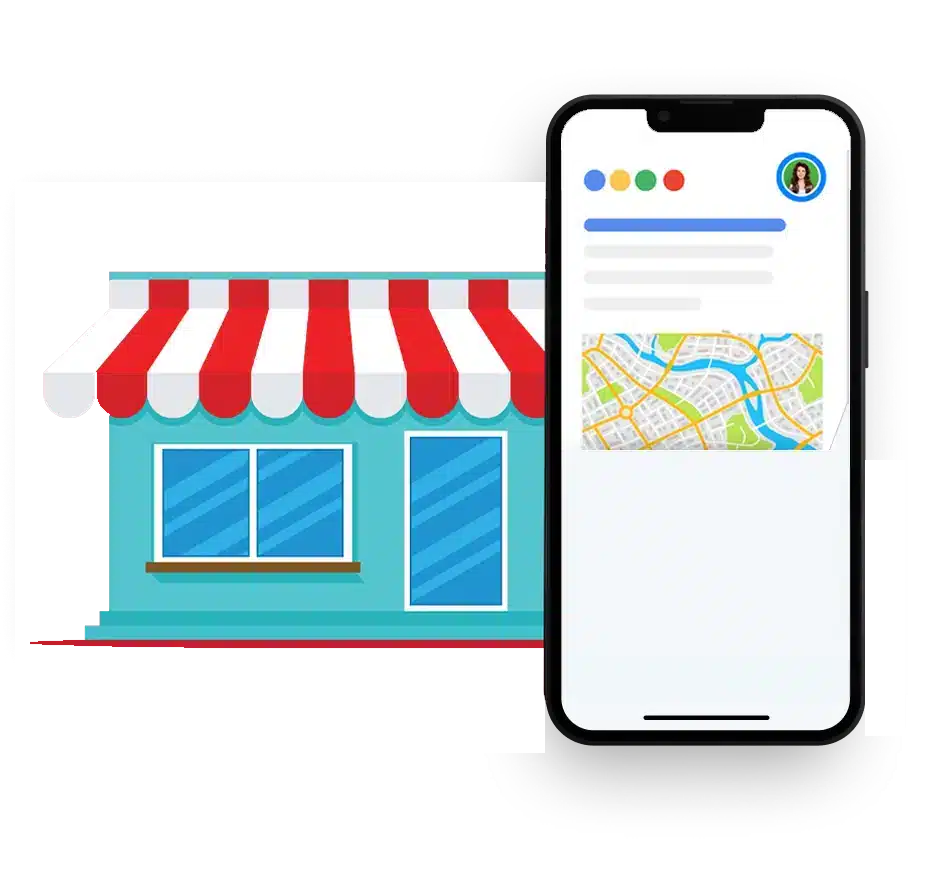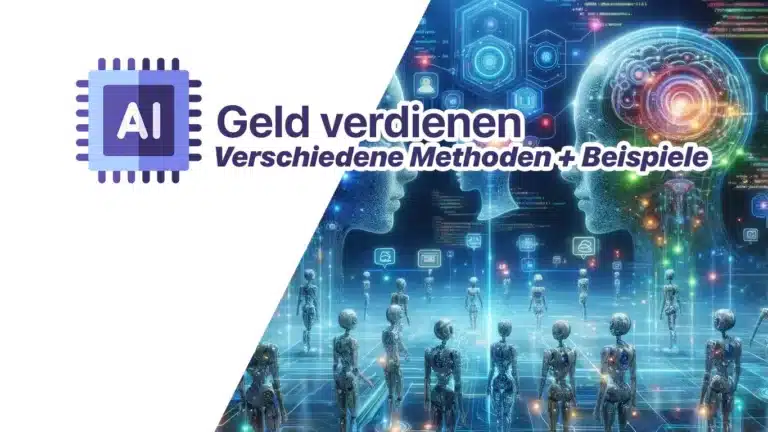Table of contents
Today I will show you different ways to easily make money with AI.
The Artificial Intelligence (AI) not only changes our everyday lives but also opens up new ways to earn money.
Today I will show you how you can use the latest AI tools and methods to not only increase your productivity but also open up new business areas.
AI Writing Services
A goldmine for creatives and content producers
AI writing tools are revolutionizing content production by enabling creatives to create high-quality content quickly and efficiently. These advanced tools offer impressive speed and efficiency, and also open up new opportunities for creativity and personalization.
Whether it’s blog posts, articles, marketing texts or even books, AI assistants like ChatGPT or JasperAI help you quickly generate initial drafts that both strike the right tone and are tailored to your target audience. This gives you more time to fine-tune and personalize your content.
Freelancers, writers and content marketing agencies can benefit from these technologies to expand their offerings and meet the increasing demand for high-quality content.
Ghost writing
An exciting field of application is the Ghost writingAI tools not only speed up the writing process but also allow you to complete more projects in less time, opening up new sources of income.
What is ghostwriting? Ghostwriting is when someone writes texts but does not publish them under their own name. Instead, someone else's name is put on it. For example, someone may write a book, but someone else gets the credit for it.
The key to success is combining human creativity with machine efficiency. The ability to revise and refine AI-generated content is critical to ensure authenticity and a personal touch. Those who can ensure this balance will succeed in the world of content production. For sure.
Developing apps and software with AI
Software and mobile application development is on the threshold of a new era, driven by the integration of Artificial Intelligence. AI tools and frameworks provide developers with the ability to create intelligent, adaptive and highly functional applications:
- Faster development: AI-powered tools like GitHub Copilot make writing code much easier. They provide real-time suggestions, automate tasks, and help with bug fixing, reducing development time and benefiting both experienced and new developers.
- New opportunities for app developers: AI makes it possible to develop apps that adapt to users and offer personalized experiences. From voice recognition to personalized recommendations, AI opens up new interactive possibilities, such as personalized health and fitness apps.
- From concept to success: AI tools support developers not only in technical implementation, but also in market research and analysis of user feedback. This enables products to be created that are not only functional but also in tune with the times, which promotes success on the market.
Monetizing AI apps means making money from them. This can be done in a variety of ways, such as offering special features for purchase, selling subscriptions, or displaying personalized advertising.
What's important is that the app really helps users and that they feel connected to it. That's the key to success.
Online marketing and advertising
The digital revolution has completely changed marketing, and artificial intelligence has become particularly important. With AI, companies can improve their marketing strategies, reach more precise target groups and maximize the success of their investments.
- Personal approach like never before With AI, marketers can take a deep look into the behavior and preferences of their target audience by analyzing complex data. The result? A personalized marketing message that speaks to each user individually, skyrocketing engagement and conversions.
- Automation for smooth campaigns AI tools such as Google Ads or Facebook Ads use machine learning to optimally place advertisements. They monitor performance and adjust the strategy in real time so that ads appear exactly when and where they are most effective. This saves time and maximizes the success of campaigns.
- Smart data analysis AI-powered analytics tools enable companies to not only understand their customers' current behavior but also predict future trends. These insights help optimize marketing strategies and increase customer loyalty. From predicting future trends to minimizing customer churn, AI enables data-driven decisions and increases business results.
- Creativity meets AI Although AI is technical, it also boosts creativity in marketing. By automating repetitive tasks, marketing teams have more time for creative and strategic planning. AI tools can help generate inspiring content, perfect visual designs, and develop innovative campaign ideas.
The potential of artificial intelligence in online marketing
Artificial intelligence (AI) has revolutionized online marketing and is already being used in various fields. However, its full potential has not yet been fully exploited. Here's how AI works in marketing and where it is already being used.
Although three quarters of decision-makers in German companies see AI as an important future technology, only six percent of companies are currently using AI. Nevertheless, there are already advanced applications in areas such as search engine optimization and customer communication.
In search engine optimization, AI tools such as the OSG Performance Suite help to improve the visibility of websites by analyzing data and automatically optimizing it. In customer communication, AI chat robots handle complex queries and continuously learn.
Although AI offers enormous potential for marketing, it has not yet been fully exploited. Future applications could include the assessment of customer potential, the further development of chatbots through natural language processing and automated target group analyses.
Studies show that many marketers recognize the potential of AI, but few actually implement itMany companies plan to improve their marketing through AI, but the practical application often falls short of expectations. AI solutions are still not very widespread, especially in the B2B segment, as companies first want to build a solid data foundation before dealing with more advanced technologies such as AI.
You can read more about this study here
Image design / photo editing

In photo editing, AI has changed how we create images.
For freelance photographers and image editors, this means a simpler, faster way of working.
- Increasing efficiency through AI tools
Modern image editing software with AI features (such as Photoshop) automatically handles tedious tasks like removing backgrounds or retouching blemishes, saving time and allowing photo editors to complete more projects in less time without sacrificing quality.
- New creative possibilities
AI tools open up entirely new creative possibilities by transforming images in innovative ways. Photo editors can experiment and create unique visual content, whether by applying different styles or creating realistic effects.
- Personalized photo products and services
Thanks to AI, photo editors can offer customized products and services with high precision. Whether individual portraits or tailor-made image compositions - AI makes it possible to precisely fulfill the customers' wishes and offer unique solutions.
- AI in photo restoration
An exciting application area for AI in photo editing is the restoration of old or damaged photos. AI algorithms can restore faded colors, remove tears and wrinkles, and even reconstruct missing parts of a photo. This not only offers new business opportunities for photo editors, but also preserves memories with an emotional added value.
As a service provider, you can restore old photos and do so professionally (for example on Fiverr) offer.
Data Science and Analytics

Data science is important for companies that want to be successful. Artificial intelligence (AI) and machine learning help find important information from large amounts of data and make smart decisions.
- Pattern recognition and predictive analytics
AI enables pattern recognition and predictive analytics. By learning from past data, AI can predict future trends, be it in consumer behavior, financial markets, or production processes. This allows companies to act proactively and take advantage of opportunities while minimizing risks.
- Automated data processing
AI can automate data collection and processing, leading to faster and more efficient analysis. Systems can process unstructured data, extract relevant information, and prepare it for further analysis. This is particularly useful in areas such as market research, medical research, and social media analysis.
- Personalization and customer analysis
In marketing and customer service, AI enables deep personalization through detailed customer analytics. Algorithms create individual customer profiles based on purchase history, interactions and preferences. This helps companies create tailored offers and increase customer satisfaction.
- Optimization of business processes
AI analytics optimizes internal business processes. By analyzing operational data, inefficient processes can be identified and improved, leading to cost savings and increased productivity. In logistics, AI contributes to route optimization and in production it helps predict maintenance needs.
AI Chatbots
Now we deal with AI chatbots for businesses.
AI chatbots have become indispensable tools for customer service and experience, providing not only 24/7 support but also personalized experiences that exceed the expectations of modern customers.
- Customer service automation
AI chatbots can automatically handle a wide range of customer queries, from simple questions to complex concerns. They are constantly learning and getting better at understanding and answering questions. This means queries can be handled faster, freeing up the customer service team to focus on more difficult cases.
- Personal customer service
By analyzing customer data, AI chatbots can provide personalized recommendations and support. They help customers find the right product, offer tailored offers, and deliver customized content. This personalized care increases customer satisfaction and promotes customer loyalty.
- Use in marketing and sales
AI chatbots can be used not only in customer service, but also in marketing and sales strategies. They can guide prospects through the sales process, provide product information, and even handle transactions. By analyzing the data from these interactions, companies can gain valuable insights into customer behavior and adapt their strategies.
- Scalability and cost savings
AI chatbots provide a scalable customer service solution that can keep up with a company's growth without the need for more staff. This scalability and the ability to handle many customer queries automatically result in significant cost savings and increased efficiency.
Social media management (setting up an agency)

AI helps manage your brand presence by helping you better understand how your target audience acts and allows you to adapt your marketing strategies accordingly.
- Content creation and planning
AI tools help create content, such as text, images and videos. They look at what is popular right now and make recommendations about what content is likely to appeal to many people. These tools also help schedule and automatically publish posts so that they are online at the best time and reach many people. For example, an AI can see that videos on a topic are very popular right now and therefore suggest that you should focus on them.
- Interaction and engagement
AI chatbots and automated response systems can be used on social media platforms to automate interactions with users. They can answer questions, collect feedback, and guide users to additional resources. For example, an AI chatbot on Facebook can automatically respond to frequently asked questions and provide links to helpful articles.
- Analysis of social media data
AI analyzes large amounts of data from different sources to identify trends, sentiments, and user opinions. These insights help companies adapt their marketing strategies to achieve their goals more effectively. For example, AI can identify that a certain type of content resonates more on Instagram than others and help companies adapt their content accordingly.
- Personalization of marketing strategies
By leveraging AI, companies can develop highly personalized marketing strategies based on user behavior and interactions. Using AI can help understand users' individual preferences and needs and deliver tailored content that leads to more conversions.
Music and audio editing

Thanks to artificial intelligence (AI), music and audio editing has evolved dramatically. AI offers new possibilities for editing, composition, and even live performance, giving artists and producers more creative freedom.
- Automated editing and mastering
AI-powered software makes audio editing easier. It can automatically mix and master tracks by analyzing the quality of recordings and suggesting improvements or applying them straight away. For example, it can balance audio tracks, adjust levels or remove background noise. This saves time and enables independent artists and small studios to produce high-quality productions.
- Creating music with AI
AI enables the composition of new music or the redesign of existing pieces in different styles. By analyzing large amounts of musical data, AI can generate melodies, harmonies and rhythms that can then be further developed and refined by musicians. This opens up new possibilities for experimental genres and unique sound experiences.
- Personalization of audio content
For podcasters and content creators, AI tools offer innovative solutions for personalizing audio content. AI can help optimize podcasts for different audiences, for example by adjusting the speaking speed or curating content based on listener preferences. This improves the listening experience and strengthens the bond with the audience.
- Restoration and conservation
Another exciting application area for AI in audio editing is the restoration of old or damaged recordings. AI algorithms can restore audio by reducing noise, repairing damaged sections, and even reconstructing lost frequencies. This technology plays an important role in preserving historical and cultural audio archives.
Using audio and music AI can create various earning opportunities:
Custom music production: An online service could use AI to compose and customize customized music for advertisements, films or video games.
Personalized podcast advertising: A platform could use AI to automatically create personalized advertising clips for podcasts based on listener interests and the context of the content.
Audio restoration and preservation: Historical audio restoration and preservation services could use AI algorithms to reduce noise and repair damaged sections.
Customized sound design services: Companies could get customized sound effects and background music for their products and events by using AI to generate audio based on their brand values and target audiences.
Automated audio mixing and mastering: An online service could use AI to improve the quality of audio tracks by automatically mixing, mastering and optimizing tracks for different platforms, which is especially recommended for independent artists and small studios.
Interpreter / Translation Service
By using AI-powered translation services, companies can reach new markets and communicate with people around the world without having to spend a lot of money on translators. These services translate texts instantly and accurately, which is especially useful for business meetings, conferences, and daily exchanges.
The improved accuracy of AI translations helps to better understand nuances and cultural differences, resulting in more natural translations and promoting global trade.
AI translation services make information accessible to everyone, including those who speak different languages. This opens up new educational and business opportunities and promotes exchange between different cultures.
AI translation services help businesses reach more people and satisfy their customers by offering their websites, product information, and customer support in different languages.
Examples of making money
Providing premium translation services: Offer customized translation packages for companies that require high-quality translations for specific industries or subject areas, reviewed by human experts and supported by AI technology.
Subscription-based platform for enterprises: Develop a platform where businesses can gain access to high-quality AI translation services offering both text and audio translation in different languages for a monthly fee.
Integrating AI translation into software: Offer software development companies the ability to integrate AI translation services into their applications by offering APIs or SDKs. License the use of your technology to these companies, who can then incorporate it into their own products.
Consulting and training: Provide training and consulting services to companies that want to develop their own AI translation systems. Help them choose the right technologies, integrate them with their existing systems and train their staff on how to use the new tools.
Translation of multimedia content: Specialize in translating multimedia content such as videos, podcasts, and webinars by using AI technology to provide automated transcriptions and translations. Then offer these services to companies looking to make their content accessible to an international audience.
SEO Services (with AI)

AI technologies make SEO optimization more efficient and effectiveby automating processes and providing precise insights.
- Automated keyword analysis: AI tools help identify relevant keywords and trends that improve website visibility. For example, they can find out which terms are most frequently searched in your industry.Example: A travel company uses AI to find out which travel destinations are currently in high demand and optimizes its website accordingly.
- Personalized content: AI makes it possible to tailor content to individual users, increasing engagement and improving conversion rates.Example: An online store uses AI to make personalized product suggestions based on the customer’s previous purchasing behavior.
- Improving the user experience: AI helps to make websites more user-friendly, which has a positive impact on search engine rankings.Example: A blog website optimizes its page loading times using AI to improve the user experience and achieve higher rankings in search results.
- Effective link building: AI automates the process of identifying and evaluating potential backlink sources, resulting in improved domain authority.Example: A company uses AI to find out which websites are highly regarded in its industry and tries to get backlinks from them.
AI in SEO services enables companies to more effectively optimize their online presence and succeed on the Internet.
Affiliate Marketing: Optimize Efficiency / Revenue

Affiliate marketing uses partner programs to promote and sell products. AI improves this strategy by providing more accurate insights and optimizing campaigns.
- Personalized recommendations: AI analyzes user behavior to make individual product suggestions and increase the conversion rate.Example: A travel blog uses AI to make personalized hotel suggestions based on the reader's previous travel destinations.
- Campaign optimization: AI continuously analyzes data such as clicks and conversions to improve affiliate campaigns and detect fraud.Example: An e-commerce company uses AI to monitor the performance of its affiliate campaigns and adjust ad budgets accordingly.
- Content optimization: AI helps create SEO-optimized content that both search engines and users like.Example: A fitness blog uses AI to create content that contains the best keywords and helps users achieve their exercise goals.
- Automated partner management: AI automates contract management and commission payouts to save time and focus on strategic planning.Example: An affiliate marketing agency uses AI to manage affiliate relationships and ensure that all commissions are paid out on time.
Selling AI-generated art
The combination of art and artificial intelligence creates a revolutionary interface that not only breaks the boundaries of traditional art but also opens up new ways to monetize creative works.
Generative artworks
AI technologies make it possible to create unique works of art that combine human creativity with machine learning. AI-powered art generators such as DALL·E or Artbreeder enable users to generate impressive images by simply inputting or adjusting parameters. These works range from realistic images to surreal compositions and open up new possibilities for artists to express themselves.
Personalization and customization
AI-generated art can be easily customized to meet customers' specific needs and desires, making it particularly attractive for personalized products. From individual portraits to bespoke designs for products such as clothing, stationery or home décor, the possibilities are virtually endless.
New sales channels
The digitization of artworks and sales via online platforms have democratized the art market. AI-generated artworks can be made available to a global audience via websites, social media or specialized online galleries. In addition, blockchain technology and NFTs (non-fungible tokens) offer new ways to market and sell digital artworks while ensuring authenticity and authorship.
Interdisciplinary projects and collaborations
AI opens up new opportunities for interdisciplinary projects where artists, technologists and scientists work together to create innovative works of art. These collaborations can lead to exciting experiments and exhibitions that blur the lines between art, technology and science.
Web design with AI

Finally, we take a look at how artificial intelligence is transforming the web design process and creating new business models in this area.
Incorporating AI into web design opens up numerous opportunities to increase efficiency, automate design processes, and create personalized user experiences. This creates new business opportunities for web designers and developers.
- Automated design processes
AI-powered design tools automate routine tasks such as layout creation, color selection, and design customization. This automation allows designers to focus on creative and strategic aspects while reducing project time.
- Personalized user experiences
By analyzing user data, AI algorithms can create personalized web designs tailored to individual preferences and behaviors. This increases user engagement and improves conversion rates.
- Accessibility and usability
AI can help make websites more accessible and user-friendly for everyone by checking design elements for accessibility and adapting them to different user needs.
- Optimization and testing
Tools with AI can test and analyze different design variations to determine the most effective version, making it possible to make data-driven decisions and continuously improve website performance.
- New business models and services
The possibilities that AI brings in web design open up new business models and services. For example, web designers can offer AI-based consulting, develop personalized design solutions or act as experts for integrating AI into existing projects.
So, the use of AI in web design not only revolutionizes the design process, but also opens up new business opportunities for designers and developers. By leveraging innovative technologies, professionals in this field can expand their services, increase efficiency and create excellent, user-tailored experiences.
How to market your service
1. AI-based writing services
Fiverr and freelancers: Ideal for offering AI-powered writing services such as blog posts, product descriptions, or marketing content. Create an attractive portfolio that highlights your skills and experience, and include examples of AI-generated writing you've refined. Emphasize how you use AI to work more efficiently and deliver creative content.
2. Development of apps and software with AI support
Freelancers and Upwork: These platforms are ideal for freelance developers offering specialized AI-based app and software development services. Make sure your profile reflects your technical skills, experience with AI tools, and successful projects. Customer reviews and recommendations can further strengthen your offering.
3. AI in photo editing
Etsy and Fiverr: If you use AI for photo editing, you can offer your services on Etsy, especially if you create personalized art or design products. Fiverr is another great platform to offer editing services, from retouching to complete image transformation with AI. Show before and after examples of your work to convince potential clients.
4. AI-generated art
Etsy: Ideal for selling AI-generated art. Create a unique store showcasing your artwork and explaining the creative process and the role of AI. Offering personalization options can make your product more attractive to buyers.
OpenSea or Rarible: These platforms are ideal for selling digital art as NFTs, allowing artists to tokenize their works and offer them on a growing market for digital collectibles.
5. Web design and development with AI
Freelancers and Upwork: These platforms offer the opportunity to offer AI-powered web design and development projects. Your profile should highlight your skills in using AI web development tools and examples of successful websites you have built. A focus on improving user experience through AI can be a strong selling point.
General marketing tips
- Clear communication: Explain clearly and understandably how AI improves your services and what added value it offers to customers.
- Portfolio and case studies: A strong portfolio with case studies and examples of your work can convince prospective candidates.
- Customer reviews: Collect positive reviews from previous customers to build credibility and trust.
- SEO optimization: Optimize your offers and profiles for search engines to increase visibility.
- Social media: Use social media to promote your services and share your work, especially on platforms that favor visual content, such as Instagram or Pinterest.



